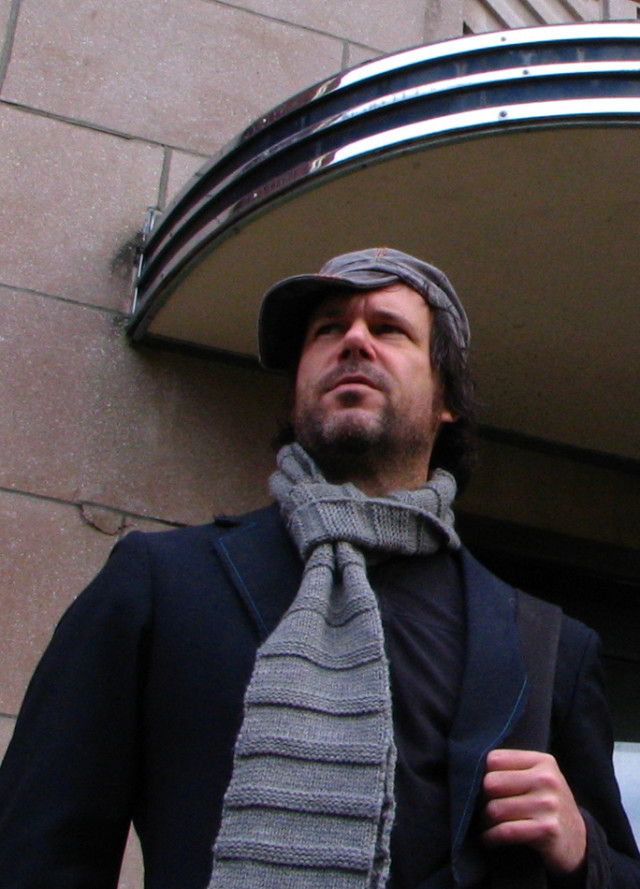Back From the Dead

THE PRESSURE MOUNTS as Daniel Gildark and Grant Cogswell race down the Oregon Coast to the Sea Lion Caves. The caves, a celebrated natural wonder and tourist trap, are the setting for a key scene in their first feature film, Cthulhu, and though the sea lions don’t know it, they’re in the script. Daylight is fading fast, the winding road adds an hour to the trip, and it’s their final day of filming with Cthulhu ’s one big-name actor, ex– Beverly Hills 90210 star Tori Spelling, before she returns to Hollywood. After a five-hour drive, Spelling and crew arrive at the caves—but the sea lions are a no-show. “It was a nightmare,” recalls Gildark, the movie’s producer, director, and coauthor. “Turns out the guy who assured us the sea lions were at the caves lied, because he wanted to meet Tori.”
Cogswell, Cthulhu ’s other author, recalls storming around in vexation, “with the whole crew pretending they weren’t staring at me out of the corner of their eyes.” And then he got it. “There was a piece of dialogue anyway about sea lions having once been people. I bent it a little so that Russ asks ‘Where are the sea lions?’ and Tori tells him the legend and says, ‘Maybe they changed their minds again.’ I hope to be that lucky next time something like that happens.” An hour later, the shoot wraps and everyone heads back up the coast to Astoria. The next day a violent storm drenches the seaside town, cutting short the filming and sending the crew back to Seattle, ahead of schedule but short on footage.
Phantom sea lions, a starstruck rube, a sudden storm that shuts down shooting… all in a day’s work for independent (or, as Cogswell calls them, “guerrilla”) filmmakers in the Pacific Northwest. Investors pulled out at the last moment, actors canceled days before filming began, cameras suffered rare software glitches. But every other setback and crisis seemed like a minor inconvenience compared to the challenge of financing the film. “There were several times when the project was threatened and we thought it would fall apart at any minute,” says Gildark, 38. “But we were determined to make this movie even if that meant shooting it with a video camera.”
Sometimes that meant scrambling in other ways. A 12-hour location shoot in Astoria, in a house owned by conservative Christians, was interrupted when the generator died right before a critical seduction scene between Spelling and Cthulhu ’s male lead, Jason Cottle. It took the crew’s gaffer three hours to get the generator running—leaving 45 minutes to complete the shoot. Spelling was half-naked, crawling on Cottle in the kitchen, when the homeowners walked through the front door. Gildark hurriedly wrapped up shooting while his assistant producer distracted the hosts.
Phantom sea lions, a starstruck rube, a sudden storm that shuts down shooting… all in a day’s work for independent filmmakers in the Northwest.
This month, all the hasty rewrites, improvised solutions, and sheer perseverance will pay off, as Cthulhu makes its debut at a private screening and then hits the festival circuit. An art-house film with a political message, it is loosely adapted from the early-twentieth-century horror master H. P. Lovecraft’s story “The Shadow Over Innsmouth.” It tells the tale of a Seattle professor who returns to his small hometown for a funeral and discovers that his estranged father leads an ominous New Age cult whose followers worship an ancient god named Cthulhu. Not your typical blood-and-guts horror film, Cthulhu is laced with broader themes: suburban sprawl, the state of national politics, the challenge people face when they return to a past they thought they’d left behind. “This film oozes Northwestiness,” boasts Cogswell. “We are telling a story that is very much of this region. This story wouldn’t have happened anywhere else.”
You might say the same thing about the filmmakers themselves. Cogswell, a homegrown poet and civic activist, is a longtime champion of audacious, even quixotic, efforts: He wrote an epic poem about Marion Zioncheck, Seattle’s doomed radical congressman in the 1930s; co-organized the monorail initiative that, for a while, set the city on its way toward elevated transit; and, in 2001, ran valiantly for City Council. Gildark was a student at Portland’s Northwest Film Center, one of the largest community-based film arts programs in the country, where Drugstore Cowboy director Gus Van Sant once taught.
Cthulhu emerged from a troubled period for both of them. Cogswell was sleeping on his old friend Gildark’s floor, recovering from a wrenching breakup. “It was a dark time,” he recalls. “The nation had just invaded Iraq, and I felt the only way to break ourselves out of the malaise was through art. Neither of us is a horror aficionado, but we wanted to make a movie with a political message, and this genre works really well for that purpose.”
Cogswell’s mind went straight to the Lovecraft story, which he was rereading—just the thing for a dark time. He penned the screenplay in 10 days and spent the next two years revising it with Gildark. Even when he was writing the script in Portland, Cogswell thought about Seattle. He wrote with specific sites and buildings, many of them friends’ homes, in mind. And Seattle offered other valuable resources: Cogswell’s fundraising network from his activist days, and veteran producers, cinematographers, and other filmmakers who knew their way around Hollywood. “To do the film on the level we wanted to do, we had to come to Seattle,” says Gildark. In Seattle they enlisted local screenwriter and director Robinson Devor as an advisor. Devor put the filmmakers in touch with his agent at the Hollywood powerhouse United Talent Agency (UTA), which led to Spelling accepting the role of a seductress charged with persuading the professor, played by Cottle, to join the mysterious cult.
{page break}

Horror story Daniel Gildark (left) directs Dennis Kleinsmith and Robert Padilla on the set for Cthulhu in Underground Seattle.
And that was where the panic first set in. UTA demanded proof that Gildark and Cogswell had at least $100,000 in the bank. But they’d already burned through their initial capital and had to raise the full sum in 24 hours. “We went to bed that night thinking we would never get the money and would have to close up shop and send everyone home the next day,” says Gildark. Cogswell, who had already sold his condo to finance the film, emptied his savings and poured every penny into the picture. After reaching into their own pockets, crewmembers and Gildark worked the phones, begging friends and family for money. By midnight they made it over that hurdle—but it wasn’t the last.
Last March, a local producer kicked in $60,000 so they could continue shooting on location in Oregon. Garr Godfrey of Real Network’s GameHouse came through with $300,000 to finish the project. With pluck, luck, and the right investor angels on their side, Gildark and Cogswell managed to traverse the cinematic valley of death without state subsidy. Uncounted other filmmakers don’t; their efforts remain unfinished and unseen, even after they empty their bank accounts and max out their credit cards.
Gildark and Cogswell are part of a community that can sometimes seem as beleaguered and mysterious as any cult: filmmakers working to revive Seattle’s sagging status as a filmmaking center. These days, the community is growing and optimism is running high thanks to two critical successes: last year’s Slamdance Film Festival Grand Jury Prize winner We Go Way Back, Lynn Shelton’s story of an actress haunted by her 13-year-old self; and Devor’s Police Beat, about a Seattle police officer’s strange days and nights, which was nominated for a Grand Jury Prize at the Sundance Festival. (Devor returned to Park City last month to debut his latest picture, Zoo, based on a Seattle man’s fatal act of equine bestiality on an Enumclaw farm last July.)
Around the city, a new generation of filmmakers is making movies at home, on their own terms. Snoqualmie Falls native Brandon Drake left Hollywood and moved back home to write and shoot Visioneers, his first feature, with his brother Jared. Brandon based the script on the people and predicaments he encountered while getting reacquainted with his old stomping grounds, and the broader cultural and economic changes in the region. The brothers shopped the script around and caught the attention of Napoleon Dynamite executive producer Jory Weitz. Visioneers, a black comedy, featuring Singles alumnus James LeGros, which savages suburban lifestyles and the corporate career ladder, finished filming in September. “There is no way we would have done this movie anywhere else,” says Drake, who plans to transfer more local stories to the silver screen. “Now that I’ve done it here there’s absolutely no reason to leave.”
The makers of an action movie starring Denzel Washington wanted to use a state ferry for an explosion scene, but Louisiana stole the picture with a better offer.
Until recently, filmmakers had little reason to stay here. In the early 1990s, movies like Assassins and Sleepless in Seattle elevated Seattle’s image as a glamorous setting, very different from Cthulhu ’s brooding terrain. And they seemed to betoken a similar rise for the local film industry. But that industry experienced a downturn almost immediately, in 1994, and has continued declining since. The most oft-cited reason is competition to the north: Vancouver, BC, began offering film companies aggressive tax incentives and luring away big-budget productions. Those incentives, combined with cheap labor, a favorable exchange rate, and flexible union policies, confirmed Seattle’s Canadian rival as Hollywood North. Veteran directors, screenwriters, actors, and crew members followed the productions out of town, migrating to Vancouver or to the traditional film capitals New York and Los Angeles.
“We really fell hard,” says Suzy Kellett, director of the Washington State Film Office. Piling insult onto injury, Vancouver has become Seattle’s cinematic body double, standing in for the Emerald City in such films as Paycheck, with Ben Affleck, and Antitrust, starring Ryan Phillippe. In a consummate irony of globalization, The Battle for Seattle, about the antiglobalization protests that erupted when the World Trade Organization convened here in 1999, is being shot across the border. The crew spent two days capturing downtown streetscapes in December and the rest of its time filming in Vancouver.
Seattle isn’t the only would-be film town to suffer. Globalization has drained the national as well as local film industries for more than a decade. A 2005 study, conducted by the Center for Entertainment Industry Data & Research and commissioned by the Screen Actors Guild and other show-biz groups, estimates that foreign governments’ incentive programs cost the American movie industry 47,000 jobs, worth $23 billion since 2000.
To protect, and perhaps even grow, their film industries, many states now offer similar incentives. In Oregon, filmmakers benefit from labor-tax credits and the four-year-old Oregon Production Investment Fund, which authorizes 10-percent cash rebates of up to $250,000 for productions spending $1 million or more in-state. That wouldn’t have helped Cthulhu, whose budget is just $700,000, but a recent report by the Eugene-based economic consultants EcoNorthwest credits the incentives with doubling Oregon’s film activity from 2003 to 2005, to $986 million. Four feature productions came to Oregon last year, including Sean Penn’s Into the Wild and Feast of Love with Morgan Freeman and Greg Kinnear.
{page break}

Star billing Tory Spelling plays the seductress in Cthulhu.
Without state incentives, Seattle has had a hard time landing even producers who’d rather film here. The makers of Déjà Vu, an action movie starring Denzel Washington, wanted to use a state ferry boat for an onboard explosion scene. But Louisiana stole the picture away by offering to bring in ferries for the project and pay the filmmakers a $14 million rebate.
Washington’s film industry has tried bravely to strike back. For several years, film professionals attempted to draft legislation authorizing incentives but the state constitution, which, unlike other states’, prohibits giving freebies to business, ruled out traditional rebates. In 2004, while Cogswell and Gildark hammered out Cthulhu ’s script, entertainment attorney Lance Rosen and Don Jensen, president of the Seattle film-developing lab Alpha Cine, were busy launching the Washington Entertainment Industry Player’s Association, dedicated to securing tax incentives for film, recording, and other productions. Its efforts paid off in 2005, when the Legislature green-lighted the Motion Picture Competitiveness Program, a $3.5 million fund replenished annually. Filmmakers in Washington can now apply for a refund of 20 percent of production expenditures, up to $1 million per project.

Zoo A new film directed by Robinson Devor (top) explores an infamous local incident with a horse.
The program paved the way for the creation of WashingtonFilmWorks, a state-backed professional association lead by an eight-member board appointed by the governor. Companies can get business-and—occupation tax credits for contributing to WashingtonFilmWorks’ war chest, which subsidizes productions coming to Washington. “It’s a starting point,” says attorney and association cochair Mark Paben. “We want to make the governor and Legislature proud and, hopefully, substantially increase the fund over the years.” Red tape stalled WashingtonFilmWorks’ fundraising until late last year, but it has since managed to raise $2.6 million, and this month filmmakers can begin applying for funding. “This is a very attractive incentive program and it’s perfect for independent films,” says James Keblas, director of the Mayor’s Film and Music Office. “That’s great for Seattle.”

But not so great for taxpayers or public integrity, in the view of some watchdogs. Chris Van Dyk, a founder of Citizens for More Important Things and prominent campaigner against stadium subsidies, contends that while tax credits make sense to keep Boeing’s enormous payroll in-state, the movie biz doesn’t offer any comparable pay-off. Instead, the city and state should help filmmaking as they would “any other” industry: “You keep taxes low, make it easy for businesses to operate, and don’t make it a biblical endeavor to get a permit.” Seattle’s Representative Jim McIntire, one of just eight House members to vote against the tax credit, says he “would have supported this measure if contributors actually saw enough benefit in the program to contribute some of their own money, and not just their tax dollars.” He offered a measure that would have made businesses give WashingtonFilmWorks $1 out of pocket for every $9 in state credits.
Regardless of the rights or wrongs, the boost arrives too late for Gildark and Cogswell, whose $700,000 Cthulhu is exactly the sort of lower-budget production that can benefit most from the new incentives. State funding could have provided crucial start-up capital, letting Gildark and Cogswell complete the film without heart-stopping crises and extreme sacrifices.
Six months later, the ordeals of the last three years are a blur to Gildark. Relaxing in his office at the back of the Northwest Film Forum after the last day of editing, he breathes a sigh of relief and says, “There were so many dark days when we were stressed out and wondering how we were going to make it happen, but I can see the light at the end of the tunnel now.” But one end is just another beginning. Gildark and Cogswell are already scouting new projects. To sustain the momentum built with Cthulhu, they’ve founded the Cascadia Film Collective, dedicated to fostering collaboration among local filmmakers. The collective will leave the lobbying to the Industry Player’s Association and instead bring directors, screenwriters, and producers together to share resources, swap experiences, and help each other produce high-quality local movies.
Seattle’s filmmaking community has often seemed fragmented compared to, say, Portland’s, where collaboration and camaraderie are a tradition. But Cthulhu ’s creators hope to change that. “We are really doing everything we can to promote a sense of brotherhood and artistry in filmmaking here,” exults Gildark. “The local film industry is getting ready to break. But this time it’s not driven by Hollywood. It’s a homegrown, indigenous film community that’s about to take off!”




